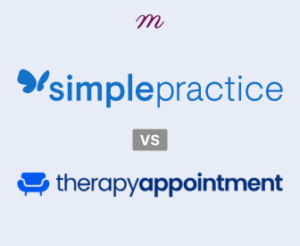Naming your therapy private practice is one of the most meaningful early steps in building your professional identity. It’s more than a creative task; it’s your chance to make a strong first impression, communicate your style, and set the tone for the clients you hope to serve. In this guide, you’ll learn how to choose a name for your therapy practice that reflects your values, avoids common pitfalls, and meets both legal and branding standards.
For more guidance on launching your private practice, from writing your first business plan to creating a voicemail script and organizing free forms, you can explore more on the **Mentalyc Blog.**
With tools like Mentalyc, you can streamline documentation from the start, ensuring your practice runs smoothly behind the scenes. It helps you create accurate, compliant notes automatically so you can stay focused on client care. And with features like Alliance Genie™, you gain supervision-like insights that support your clinical growth as your practice evolves.
Practical Steps to Naming Your Private Practice

Step 1: Brainstorm Ideas That Reflect Who You Are
Before jumping into word lists, start with self-reflection. Ask:
- What do I want my clients to feel? (safe, hopeful, empowered?)
- What kind of therapy experience am I offering? (structured and goal-oriented, or warm and relational?)
Then translate those answers into naming elements:
- Reflect your values: Choose words that express your philosophy—like growth, healing, balance, or clarity.
- Highlight your specialty: If you work with anxiety, trauma, or couples, consider weaving that focus into your name (e.g., Calm Path Counseling or Renew Relationships Therapy).
- Create emotional resonance: Names that evoke comfort (Haven, Serenity) or transformation (Elevate, Thrive) tend to connect well with therapy clients.
- Personal brand approach: Using your name (Dr. Smith Therapy) builds personal credibility and familiarity—especially if you plan to market through professional reputation and referrals.
Tip: Many therapists overthink the “perfect” name. Start wide. Jot down 20–30 ideas without judgment, you’ll refine them later.
Step 2: Narrow Your Options with Strategy, Not Guesswork
Once you have ideas, evaluate them through both a creative and practical lens:
- Keep it simple and memorable: If clients can’t spell or pronounce it, they won’t Google it. Short, clear names tend to perform better in directories and search results.
- Avoid potential confusion: Check that your initials or phrases don’t form awkward or unintended meanings.
- Think long-term: Avoid names tied too narrowly to your current location or service if you might expand or diversify later.
- Ask for feedback: Run your top 3 choices by colleagues or even clients, they often notice nuances you might miss.
Tip: Pick a name that sounds natural when spoken aloud in session introductions or over the phone. If you’d hesitate to say it out loud, it’s not the right fit.
Step 3: Finalize and Build Around It
Once you’ve found a name that feels aligned, take steps to protect and build on it:
- Check digital availability: Search Google, state registries, and domain hosts to ensure it’s unique. Secure your website domain early, it’s often the first impression of your brand.
- Visualize the brand: Imagine how the name appears on a business card, website header, or social media page. Does it look as good as it sounds?
- Plan for evolution: If you may transition from solo to group practice, pick something flexible (for example, Haven Therapy Collective can easily grow into a multi-therapist brand).
Tip: Building a private practice name goes hand in hand with strong systems. Tools like Mentalyc can help you document sessions and manage administrative work efficiently -giving you more time to focus on branding, growth, and client care.
Checklist for Naming Your Therapy Private Practice
| Checklist Item | Description | Why It Matters | Tip |
| Clarify Your Brand Identity | Define your mission, values, and the emotions you want your name to evoke. | Aligns your name with your practice’s purpose and therapeutic style. | Ask yourself: How do I want clients to feel when they see my name? |
| Identify Your Target Audience | Consider who you primarily serve: individuals, couples, families, or specific demographics. | Ensures your name resonates with the right clients. | Use words that speak directly to your ideal client’s goals (e.g., “growth,” “healing,” “balance”). |
| Check for Uniqueness | Search online, on Google Maps, and professional directories for existing names. | Prevents confusion, trademark issues, and domain conflicts. | Use Namechk or the U.S. Patent and Trademark Office database to verify availability. |
| Test for Memorability | Say your name aloud and ask others to repeat it. | Memorable names make your practice easier to find and recommend. | Keep it short—ideally under three words and easy to spell. |
| Consider SEO and Keywords | Include words like therapy, counseling, or wellness if relevant. | Improves your visibility in online searches. | Balance clarity with creativity—avoid keyword stuffing. |
| Check Domain and Social Media Availability | Verify that your website URL and handles are available across major platforms. | Keeps your counseling business branding consistent online. | Aim for a .com domain; use the same handle across all platforms. |
| Ensure Cultural and Ethical Sensitivity | Avoid terms that could be misinterpreted, stigmatizing, or culturally insensitive. | Maintains professionalism and inclusivity. | Ask peers or mentors to review your name for unintended meanings. |
| Review Legal and Licensing Requirements | Check local or state board guidelines for business naming rules. | Ensures your name complies with professional and legal standards. | Some regions require “Counseling” or “Therapy” to match licensure type. |
| Visualize Your Branding | Consider how the name looks in a logo, website header, or business card. | Creates a cohesive brand image across materials. | Test several font styles or mockups before finalizing. |
| Get Feedback Before Finalizing | Ask colleagues or clients for impressions of your top choices. | Helps confirm your name conveys the right message. | Choose the name that feels both authentic and professional. |
Tips for Brainstorming Therapy Practice Names
When brainstorming potential names for your therapy practice, it’s essential to consider various factors contributing to its effectiveness and resonance with your target audience. Here are some key reflection questions to guide you through the process:
- Emotional Resonance:
- Does the name evoke the emotions and feelings you want clients to associate with your practice?
- How does the name align with the atmosphere and approach you aim to cultivate in your therapeutic interactions?
- Memorability:
- Is the name easy to remember and pronounce?
- Will it stand out in clients’ minds and make a lasting impression?
- Potential for Future Growth:
- Does the name allow for flexibility and scalability as your practice evolves?
- Will it accommodate potential expansions of your services or shifts in your target demographic?
By carefully considering these questions alongside the practical steps outlined earlier, you can ensure that your therapy practice name reflects your professional identity, resonates deeply with your clients, and supports the growth and development of your practice over time.
The Importance of Market Research for Therapy Practice Names
In the competitive world of therapy practices, conducting comprehensive market research is crucial to creating a name that captures attention and connects with your desired audience. By delving into industry trends, studying competitors’ practice names, and understanding the preferences of potential clients, therapists can make well-informed decisions that will set their practice names apart from the competition.
Comparison of Naming Styles for Therapy Practices
| Naming Style | Description | Private practice name ideas for therapists | Best For | Pros | Cons |
| Personal Name | Uses the therapist’s full name to build a personal, trusted brand. | Jane Smith Therapy, Dr. Lopez Counseling | Solo practitioners or those emphasizing personal connection | Builds credibility and trust; easy to associate with expertise. | Harder to scale into a group practice; less memorable or creative. |
| Descriptive / Service-Based | Highlights the type of service or specialty offered. | Mindful Path Counseling, Anxiety & Wellness Center | Practices that want to clearly define their focus or niche. | Clear, SEO-friendly, immediately communicates purpose. | Can sound generic; may limit expansion if offerings change. |
| Emotional / Outcome-Focused | Emphasizes client transformation, healing, or desired results. | Renew Therapy Group, Calm Mind Psychotherapy | Practices focusing on emotional resonance and client outcomes. | Evokes trust, warmth, and relatability; strong emotional appeal. | May overlap with other practices; less clinical tone. |
| Metaphoric / Symbolic | Draws from nature, psychology concepts, or metaphors for growth. | Oak & Sage Therapy, Anchor Mental Health | Practices wanting to project creativity or holistic philosophy. | Unique and memorable; stands out in crowded markets. | May require explanation; not ideal for insurance listings. |
| Location-Based | Uses a city, region, or landmark to highlight local connection. | Seattle Wellness Center, Riverbend Counseling | Practices focused on local clientele or community-based work. | Improves local SEO; easy for clients to identify. | Limits reach if expanding beyond region. |
| Abstract / Modern | Uses short, distinctive, or coined words that sound modern or tech-forward. | Lyra Health, Tranquil, Nuvana Therapy | Group practices, startups, or digital therapy brands. | Brandable, scalable, and adaptable across services. | Less intuitive meaning; may require brand storytelling. |
The Role of Cultural Sensitivity and Inclusivity in Practice Naming
When selecting a name for your therapy practice, embracing potential clients’ diverse cultural backgrounds and identities is vital. A culturally sensitive and inclusive name can create a welcoming and safe environment for individuals from all walks of life. However, it’s also crucial to anticipate and address any challenges or pitfalls therapists may face when considering cultural factors in the naming process.
Legal Considerations When Naming Your Practice
- Trademark Search: Before finalizing your business name, conducting a comprehensive trademark search is essential to ensure that another business has not already registered it in the same industry. Utilize the U.S. Patent and Trademark Office (USPTO) database for this purpose and seek guidance from a legal professional if needed.
- Domain Name Availability: Securing a domain name that matches your website is essential when creating an online presence. You can check the availability of domain names on registries such as GoDaddy or Namecheap.
- Business Name Registration: Register your business name with your state’s business registry. This step will help you stay legally compliant and safeguard your brand identity.
- Intellectual Property Rights: Consider registering your practice name as a trademark to safeguard it from unauthorized use and infringement by competitors.
- Consult with Legal Professionals: It’s essential to consult with legal experts who specialize in intellectual property law to receive guidance on complex legal matters and to guarantee adherence to applicable regulations.
How to Test and Finalize Your Counseling Practice Name
- Brainstorming Techniques: Use mind mapping, word association, or descriptive and abstract names to generate ideas.
- Gathering Input: Get input from colleagues, friends, or focus groups. Ensure the name is easy to spell and say and is relevant to your services.
- Testing Impact: Test the impact of your top name choices through surveys or focus groups. Analyze how the names resonate with peers and potential clients.
Once you’ve selected a name for your counseling practice, it’s time to make it official. Here are the steps to finalize your chosen name:
- Register Your Business Name: Register your business name with your state’s business registry to ensure legal compliance and protect your brand identity.
- Secure Domain Name: Secure a matching domain name for your website to establish an online presence. Check domain name registries like GoDaddy or Namecheap for availability.
- Design Visual Identity: Develop a logo that complements your name and brand identity. Choose brand colors that resonate with your practice’s values and enhance brand recognition across different platforms.
- Establish Social Media Presence: Create profiles on social media platforms that align with your target audience. Consistency in branding across all channels helps reinforce your practice’s identity.
- Trademark Protection: Consider registering your practice name as a trademark to protect it from unauthorized use and infringement. Consult with legal professionals specializing in intellectual property law for guidance on trademark registration and protection.
Common Mistakes to Avoid When Naming a Therapy Business
Misleading Names: Ensure your name accurately reflects your services and isn’t dishonest..
Complex or Hard-to-Pronounce Names: Avoid names that are difficult to say or spell.
Overly Clever or Gimmicky Names: Avoid names that might seem too clever or gimmicky and can be off-putting to potential clients.
Not Checking Availability: Ensure the name isn’t already used to avoid confusion and potential legal issues.
The Bottom Line: Naming is Just the Beginning
Choosing the right therapist business name involves balancing creativity with legal and practical considerations. A thoughtful name not only connects with your audience but also reflects your brand and meets all necessary requirements. With careful planning and reflection, your practice name can help attract clients and build long-term trust.
As you lay the foundation for your private practice, it’s equally important to invest in systems that support growth from day one.
That’s where Mentalyc comes in: a Clinical Intelligence platform that streamlines documentation, tracks progress, and offers supervision-like insights through Alliance Genie™. It’s a smart, future-ready companion for therapists building their business with clarity and care.
FAQ: Choosing the Right Name for Your Therapy Practice
How important is the name of a therapy practice?
Your therapy practice name is crucial because it shapes first impressions and communicates your brand identity. A clear, memorable name builds trust, attracts your ideal clients, and reflects your values or specialty. It also improves online visibility and helps differentiate your practice in a competitive mental health field.
What should I consider when choosing a counseling practice name?
When naming your counseling practice, consider your values, target audience, and specialty. Aim for a name that is easy to spell, pronounce, and remember. Check domain availability, avoid confusing or overly clinical terms, and choose something that conveys warmth, professionalism, and your therapeutic approach.
How do I narrow down the options and make a final choice?
Start by listing names that reflect your style or specialty, then eliminate those that are difficult to say or already taken. Test your top options with colleagues or clients for clarity and tone. Finally, confirm domain availability and ensure the name aligns with your long-term growth goals.
Any tips for generating therapy practice name ideas?
Brainstorm around your core values (healing, growth, balance), specialty (anxiety, couples, trauma), and tone (calm, empowering, hopeful). Use tools like word maps or thesauruses for inspiration. Combine emotional or symbolic words—like Haven, Anchor, or Clarity—to create names that feel both meaningful and professional.
How do you name your therapy practice?
To name your therapy practice, start by identifying words that capture your approach or values. Keep the name short, clear, and emotionally resonant. Check online for uniqueness and legal availability. Finally, get feedback from trusted peers or clients before registering your business or securing the website domain.
What is a good name for a psychology practice?
A good psychology practice name is authentic, easy to remember, and aligned with your therapeutic focus. Examples include Insight Psychology Center, Thrive Mental Wellness, or Renew Therapy Group. Choose words that inspire trust and reflect professionalism while resonating with your ideal client population.
How do you name a mental health clinic?
When naming a mental health clinic, focus on clarity and compassion. Use words that evoke safety, hope, and wellness like Serenity, Pathways, or Harmony. Ensure the name suits a team-based practice, scales well for future growth, and complies with your region’s healthcare naming regulations.
Why other mental health professionals love Mentalyc

“Do yourself a favor, make your life easier. Use the tools that are readily available … I found Mentalyc to be one of the best tools that I’ve ever used.”
Licensed Marriage and Family Therapist

“If I were recommending this software to a colleague, I would tell them that it is the best thing that they could do for their practice.”
Licensed Professional Counselor

“For those who have hesitations … It is a lifesaver. It will change your life and you have more time to be present with your patients.”
Licensed Clinical Social Worker

“It immediately changed my quality of life, personally and professionally. I went from 3–4 hours a week of notes to 1 hour at most … that alone is invaluable personally and professionally.”
Owner/Independently Licensed Marriage & Family Therapist (IMFT)






